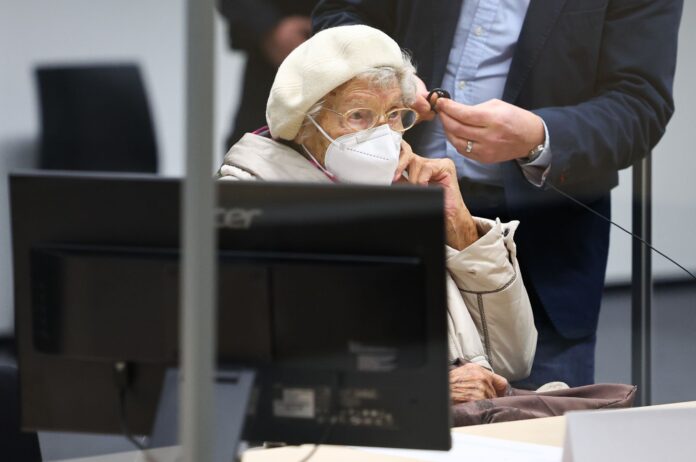Germany’s Federal Court of Justice on Tuesday upheld the conviction of a 99-year-old former secretary at the Stutthof concentration camp.
The woman was convicted for aiding and abetting the mass murder of more than 10,000 people between June 1943 and April 1945.
The court sitting in the eastern city of Leipzig dismissed the appeal against a verdict handed down by the Itzehoe Regional Court, to the north of Hamburg, in December 2022.
The regional court had sentenced the woman to a two-year suspended juvenile sentence for aiding and abetting murder in 10,505 cases and attempted murder in five cases.
The woman, identified under German privacy laws as Irmgard F, received a youth sentence as she was under 21 years old at the time the crimes were committed. Tuesday’s decision is now final.
The case is considered the likely last criminal trial for addressing the Nazi mass murders.
It was also the first time a civilian worker was found guilty for the crimes committed at the camps.
Due to its historical significance, recordings of both the hearing and the announcement of the decision in Leipzig were made for the Germany’s Federal Archives.
Secretary to the camp commander
Irmgard F was employed as a typist in the commandant’s office of the Stutthof Nazi concentration camp near what was then the Free City of Danzig – now Gdańsk in Poland – when she was 18-19 years old.
The regional court had judged that through her work, the young woman had assisted the camp’s officials in the systematic killing of inmates. Also, supporting activities could legally be seen as aiding and abetting murder.
Irmgard F’s defence team had filed the appeal. The Federal Court of Justice, Germany’s highest civil and criminal court, held an oral hearing on the matter at the end of July.
The lawyers tried to cast doubt, among other things, whether intent could be proven against her. They argued it was not shown that she really knew what was happening in the camp.
Additionally, they said her work as a typist did not differ significantly from her previous job in a bank. From her perspective, she had carried out “neutral actions.” The federal judges did not agree with this argument.
The Federal Court of Justice confirmed the Itzehoe Regional Court’s assessment that Irmgard F had provided assistance to the murders through her willingness to serve. Almost all of the camp’s correspondence passed over the desk of the typist.
Furthermore, the court said, she looked over part of the grounds from her workplace, saw the chimney of the crematorium and knew about the horrific condition of the prisoners.
Irmgard F was not present for Tuesday’s ruling.
Nearly 65,000 people murdered
According to the Arolsen Archives documentation centre, approximately 110,000 people from 28 countries were imprisoned in the Stutthof concentration camp and its 39 subcamps between 1939 and 1945. Almost 65,000 did not survive. Most were murdered in gas chambers.
The camp commander, Irmgard F, worked for Paul Werner Hoppe. Irmgard F was given a nine-year jail sentence in 1957 for aiding and abetting the murder of just a few hundred people.
Gabriele Cirener, the presiding judge at the court in Leipzig, said on Thursday that Hoppe’s light sentence does not make sense nearly 70 years later, calling it the result of decades of “misguided prosecution practice” of Nazi perpetrators.
A new approach to Nazi crimes
In recent years, a number of former concentration camp employees have had to stand trial at an advanced age.
For decades, the German justice system had only prosecuted those who were part of the management of the concentration camps or who had committed murder themselves or who had attracted attention due to their particular cruelty.
A turning point was the trial of former guard John Demjanjuk, who was convicted in 2011 at the age of 91 for his activities in the Sobibor extermination camp in Nazi-occupied Poland.
The president of the Central Council of Jews in Germany, Josef Schuster, welcomed the Leipzig’s court’s decision.
“The legal system has sent a clear message today: Even almost 80 years after the Shoah, no line must be drawn under the Nazi crimes. Murder is not time-barred – neither legally nor morally,” he said. – dpa



